The journey of enslaved Africans, marked by the relentless march of British and Spanish invaders, illustrates a tumultuous chapter in Kingston’s history. Initially, the Spanish laid claim to the land, establishing plantations that thrived on forced labor and religious conversion. However, the arrival of British forces ignited fierce struggles for dominance, altering the island’s very fabric. Amidst these conflicts, the harrowing transatlantic slave trade unfolded, leaving an indelible mark on the lives of countless individuals. As Kingston emerged as a cultural melting pot, the echoes of this tumultuous past still resonate today, prompting questions about its enduring legacy.
About Your Stay
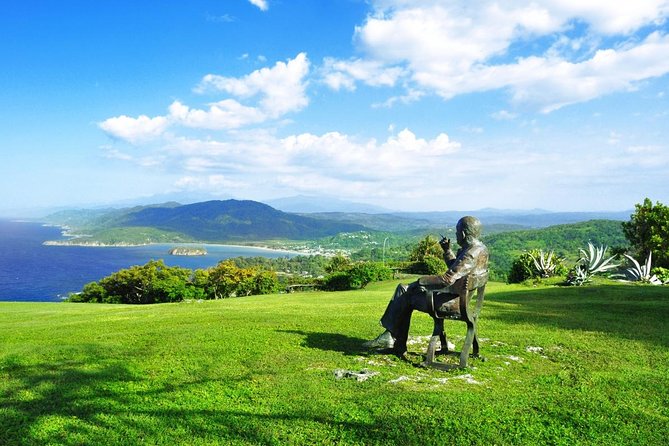
- Kingston, established during the colonial era, became a vital port for the transatlantic slave trade and trade routes.
- Spanish colonization initiated sugar plantations, leading to increased demand for enslaved Africans and significant demographic changes in Jamaica.
- British forces seized control from the Spanish in the late 17th century, altering governance and the island’s economic landscape.
- The transatlantic slave trade forcibly transported millions of Africans to Kingston, creating a new social hierarchy centered around plantation economies.
- Cultural influences from enslaved Africans, such as music and cuisine, shaped Kingston’s identity and legacy, reflecting resilience and diversity.
Historical Context of Kingston
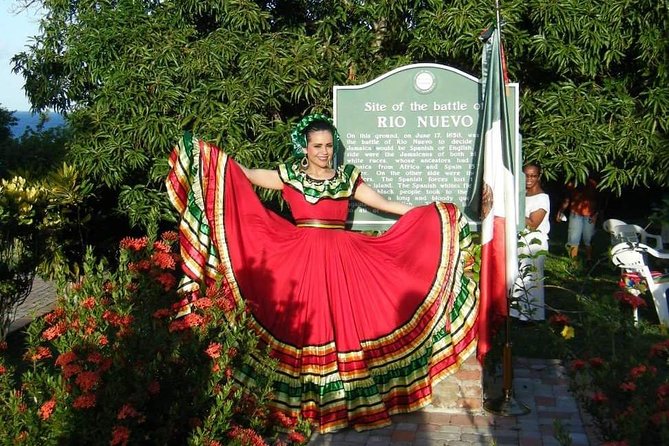
Kingston, Jamaica, stands as a vibrant testament to its complex history, shaped significantly by the arrival of British and Spanish invaders.
The city emerged as a crucial port during the colonial era, serving as a hub for trade and the transatlantic slave route. Its strategic location facilitated the import of enslaved Africans, whose labor became the backbone of Jamaica’s sugar economy.
Over time, Kingston evolved, attracting a mix of cultures, but the scars of colonialism persisted. The remnants of its colonial past are visible in the architecture and city layout, echoing the struggles and resilience of its inhabitants.
Today, Kingston embodies a rich tapestry of history, reflecting both the pain and triumph of its diverse heritage.
You can also read our reviews of more tours and experiences in Kingston.
The Impact of Spanish Colonization
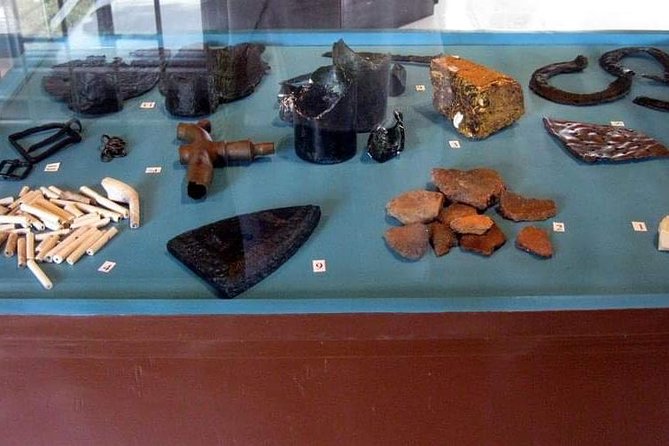
Spanish colonization profoundly shaped Jamaica’s social and economic landscape, leaving an indelible mark on its history.
The Spanish established plantations, primarily cultivating sugar, which transformed the island into a profitable colony. This agricultural boom fueled the demand for enslaved Africans, effectively altering the demographic makeup and leading to a rigid class structure.
Spanish influence introduced Catholicism, intertwining religion with daily life and establishing cultural practices that persist today.
Plus, the Spanish laid the groundwork for infrastructure, building roads and ports that facilitated trade.
Despite their eventual decline, the Spanish left a legacy of architecture and language, embedding their influence into Jamaica’s identity.
The complexities of this period still resonate, echoing through generations and shaping contemporary Jamaican society.
The Arrival of British Forces
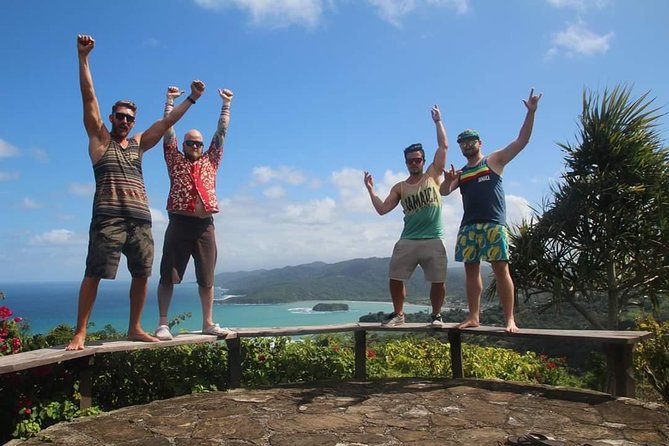
With the winds of change sweeping through the Caribbean, British forces arrived in Jamaica during the late 17th century, marking a pivotal shift in the island’s colonial landscape.
The British aimed to seize control from the Spanish, drawn by Jamaica’s fertile lands and strategic location. Their arrival ignited fierce battles, as they quickly established settlements and fortified positions.
The British brought new governance, altering the island’s economy and social structure. Plantations flourished under their rule, fueling the demand for labor.
As British influence expanded, resistance from the Spanish and the local population intensified. This tumultuous era set the stage for Jamaica’s transformation, laying the groundwork for complex cultural and economic dynamics that would shape the island’s future.
The Transatlantic Slave Trade
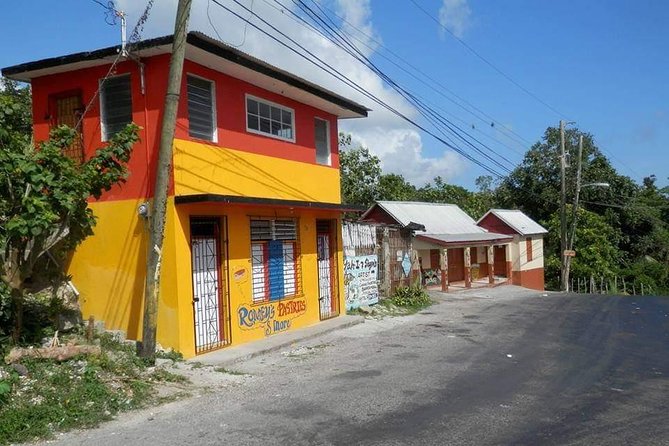
How did the Transatlantic Slave Trade reshape societies across the Caribbean? This brutal exchange transformed the demographic and economic landscapes of the region.
Millions of Africans were forcibly taken from their homelands, enduring horrific conditions aboard slave ships. Upon arrival, they were sold into slavery, creating a new social hierarchy that placed enslaved individuals at the bottom.
Plantations flourished, driven by the labor of these enslaved people, leading to the Caribbean’s economic dependency on sugar and tobacco.
The cultural influences of African traditions began to blend with European customs, giving rise to unique Caribbean identities.
The legacy of the Transatlantic Slave Trade continues to resonate, as it laid the foundation for complex societal structures that persist to this day.
Life of Enslaved Individuals
Navigating the harsh realities of daily life, enslaved individuals in the Caribbean faced relentless challenges that shaped their existence. From grueling labor in the fields to the constant threat of punishment, their lives were marked by suffering and resilience. Despite the oppressive conditions, they forged strong communal bonds, often finding solace in shared experiences and cultural practices.
| Challenge | Impact | Coping Mechanism |
|---|---|---|
| Forced Labor | Exhaustion and despair | Community support |
| Punishment | Fear and trauma | Spiritual practices |
| Poor Living Conditions | Health issues | Resourcefulness |
| Separation from Families | Emotional distress | Creating surrogate families |
| Cultural Erasure | Loss of identity | Preservation of traditions |
Through their enduring spirit, enslaved individuals carved out a sense of identity amidst adversity.
Cultural Influences and Legacy
The cultural influences and legacy of enslaved individuals in Jamaica are profound, shaping the island’s identity and traditions. Enslaved Africans brought diverse languages, culinary practices, and spiritual beliefs, melding them into a rich tapestry that defines Jamaican culture today.
The rhythms of reggae and dancehall music echo African heritage, while traditional dishes like jerk chicken and ackee and saltfish showcase their culinary ingenuity. Rastafarianism, rooted in the experiences of these individuals, emphasizes community, resistance, and spirituality, resonating deeply within Jamaican society.
Festivals celebrating African heritage, such as Emancipation Day, honor their resilience and contributions. This cultural legacy remains a vital thread in Jamaica’s narrative, influencing art, music, and social movements, ensuring that the spirit of the enslaved continues to inspire future generations.
Modern Perspectives on History
Understanding the legacy of enslaved individuals in Jamaica reveals how historical narratives can shape modern perspectives on identity and culture. The ongoing discourse about this legacy influences society in various ways:
-
Cultural Identity: Enslaved individuals’ stories contribute to a rich tapestry of Jamaican culture, fostering pride and resilience.
-
Historical Education: Recognizing the past allows for a more comprehensive curriculum, promoting awareness of the injustices faced by enslaved people.
-
Social Activism: Acknowledging these histories encourages contemporary movements advocating for social justice and equality.
These aspects highlight how modern perspectives are rooted in the past, urging individuals to confront uncomfortable truths while celebrating the strength and contributions of those who endured.
As such, understanding history becomes essential for shaping a more inclusive future.
Planning Your Journey Today
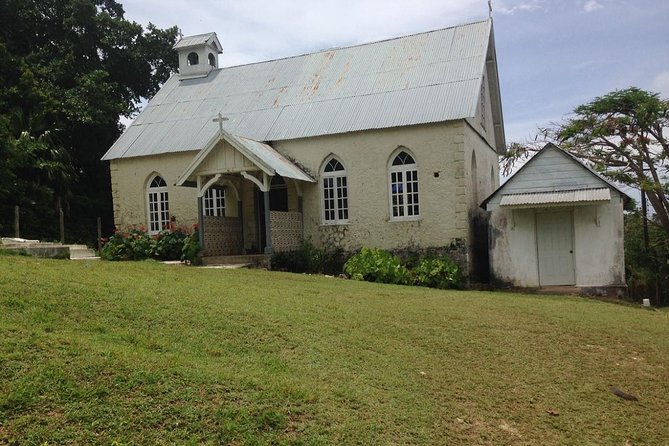
Embarking on a journey through Kingston’s historical landscape offers a profound connection to Jamaica’s past, inviting travelers to explore the enduring legacy of enslaved individuals.
To plan this enlightening experience, travelers can book a private tour that ensures an intimate exploration with only their group. Starting at 09:00 am, participants can select a convenient pickup point, with hotel or port pick-up included.
The tour, priced from $256.42 per person, includes admission fees, food, and drinks, while an English-speaking guide enhances understanding of the rich history.
With free cancellation up to 24 hours before departure, travelers can secure their spot without worry. Now’s the time to reserve and embark on this impactful journey through Kingston’s heritage.
Questions About Your Stay
What Should I Wear for the Tour?
For the tour, he recommends lightweight, breathable clothing suitable for warm weather. Comfortable walking shoes are essential, along with a hat and sunglasses for sun protection. A light jacket might be handy for cooler moments.
Are There Any Age Restrictions for Participants?
He checked the details, noting there aren’t strict age restrictions for participants. Most travelers can join, but it’s not recommended for pregnant women, ensuring everyone enjoys the experience comfortably and safely.
Is Transportation Included in the Tour Price?
Transportation’s included in the tour price. Participants enjoy convenient hotel or port pick-up and drop-off, ensuring a hassle-free experience. With an English-speaking guide, they’ll explore the rich history of Kingston effortlessly.
Can I Bring My Own Food and Drinks?
She wondered about bringing her own food and drinks. The tour guidelines didn’t mention restrictions, so it’s best to check directly with the provider to ensure a smooth and enjoyable experience for everyone.
What Languages Are Available for the Tour Guide?
The tour offers an English-speaking guide, ensuring clear communication and engagement throughout the experience. Participants can enjoy informative insights and stories, enhancing their understanding while exploring the rich history and culture of the destination.
Booking Your Stay
The intertwining histories of enslaved Africans, British forces, and Spanish colonizers have left an indelible mark on Kingston’s identity. This vibrant city, shaped by the struggles and resilience of its people, continues to celebrate its rich cultural heritage. As visitors explore Kingston today, they can witness the lasting influences of these diverse narratives, reminding them of the profound legacy that echoes through its streets, music, and traditions. Kingston stands as a testament to survival, strength, and unity.
More Tour Reviews in Kingston
- Private Transfer From Kingston Airport (Kin) to Montego Bay Port
- Private Transfer From Kingston Airport (Kin) to Falmouth Port
- Sandals Montego Bay to Kingston Airport
- Private Transfer Kingston Airport (KIN) To & From Sandals South Coast
- Riu Aquarelle Private Airport Transfer.
- Dunns River Falls, Zipline Adventure From Kingston
Not for you? Here's more things to do in Kingston we have recnetly reviewed
- 2 Best Guided Tours In Kingston
- 2 Best Sailing Experiences In Kingston
- 3 Best Shopping Tours In Kingston
- 6 Best Cruises And Boat Tours In Kingston
- 3 Best Coffee Tours And Tastings In Kingston
- Group Private Kingston Airport Transfers (4 – 9 Persons)
- Scenic Blue Mountain Hike From Kingston
- Kingston & Blue Mountain Adventure
- Blue Mountain Bicycle Tour From Runaway Bay
- Kingston Airport Private Transfer to Moon Palace Jamaica Grande
- Private Round Trip Transfer Norman Manley Airport KIN to Kingston by Minivan
- Private Norman Manley Airport Transfers To&From Montego Bay MBJ
